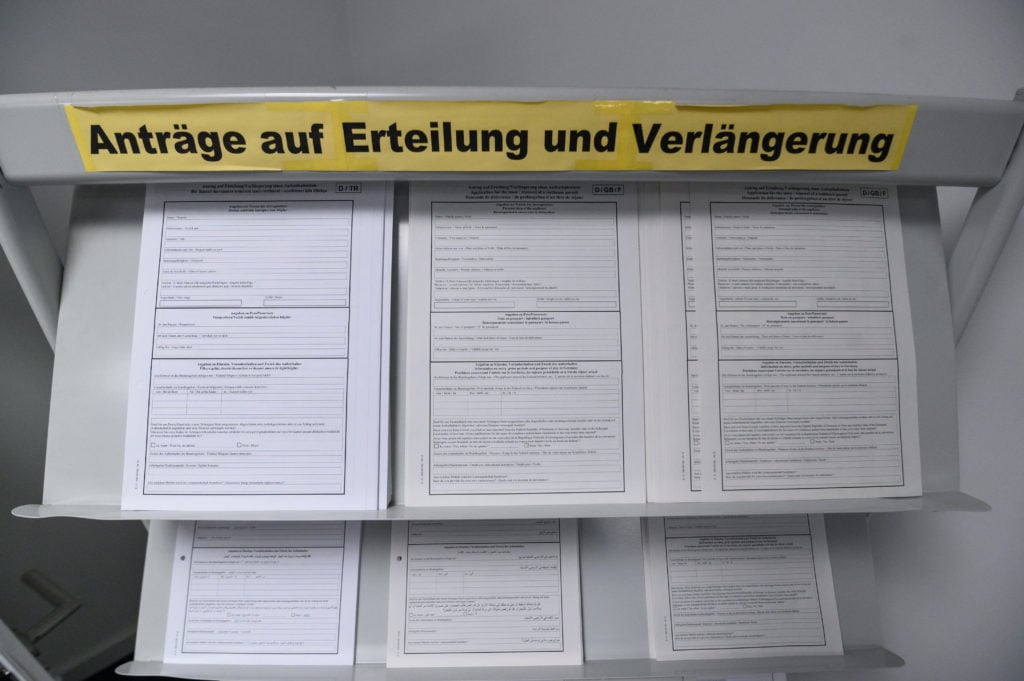EXPLAINED: How to get a visa to start up a business in Germany

With Germany’s current skilled labour shortage, the government is liberalising many of its immigration laws to make it easier for people to come to the country for work. But what about those who want to start up their own business?
With the German government introducing the points-based Chancenkarte to help ease the country’s skilled labour shortage, non-EU skilled workers will soon have another way to come to Germany to look for skilled work. But for the more entrepreneurial, Germany has a visa for those looking to work as self-employed freelancers – or start up a business.
But before you come to Germany, there’s one key question to work out – do you need a visa to enter the country?
READ ALSO: Chancenkarte: How many points could you get on Germany's skilled worker visa?
Nationals of non-EU countries like Australia, Israel, Japan, Canada, New Zealand, South Korea, the US, and UK can come to Germany for up to three months without a visa – and then apply for a residence permit for self-employed activities from their local immigration office after registering their residence in Germany.
People who aren’t nationals of these countries will probably have to set up a visa appointment at a German mission abroad. A decision could take anywhere from a few days to a couple of months. After that, they can enter Germany but still have to go through the residence permit application after arriving and registering an address.
The documents required, however, for both the visa and the residence permit of self-employment are essentially the same.
READ ALSO: COMPARED: Germany’s Chancenkarte vs. Austria’s Red-White-Red card for skilled non-EU workers
What documents do I need?
Germany has two main classes of self-employed workers. These are Freiberufler and Gewerbetreibender – basically, “freelancers” and “tradespeople.”
Freiberufler are typically people who work in “liberal professions” who provide independent services in the fields of healing, technical professions, consulting, or otherwise. These can include doctors, lawyers, computer scientists, engineers, or even writers and business consultants. Typically, these are more academic professions requiring university education.
Gewerbetreibender are typically tradespeople in a commercial field – often in a regulated profession. These include those making products, carpenters, and cleaners for example. They can also include small retailers.
If you’re not sure which one you would fall under, you can ask your German mission abroad or local tax office in Germany.

Forms for visa applications at the Immigration Office. All non-EU nationalities have to apply for a residence permit to start up a business, even if they already have a visa for that purpose. Photo: picture alliance/dpa | Jonas Walzberg
Both types of entrepreneur will need to prove that they have the means to fund their undertaking, either through capital or a loan, and some money set aside to support themselves. Both will need to prove their potential business is viable by submitting a business plan.
For Freiberufler, this plan is meant to show that they will be able to make a living for themselves. For Gewerbetreibender, they’ll need to demonstrate that their business will satisfy a commercial interest or regional demand, and is likely to have a positive impact on the economy – for example by creating jobs.
READ ALSO: The complete guide to getting a freelance visa in Germany
Both will obviously need documents like their application forms, valid passport, biometric photos, and proof of health insurance.
Both will also need to prove they have an adequate pension plan or money put away for retirement if they are aged 45 years or older. To apply for a residence permit in Berlin for example, applicants can show that they either have an asset that is at least €206,293 in value – or will be able to collect a pension of at least €1,432.59 when they retire at age 67.
READ ALSO: Germany or Austria: Where is it easier to get an EU Blue Card?
What’s different about applying as one type of entrepreneur or another?
While many documents that both types of entrepreneur need for either a visa for self-employment or the corresponding residence permit from their local authority are the same – there’s one big difference.
Gewerbetreibender will need to register their business in their local trade register and bring the proof with them when applying for their residence permit. The document you get proving this registration is called a Gewerbeanmeldung. Depending on your trade, you may be asked to prove that you have the necessary qualifications to practice this in Germany either to your visa appointment or to register your trade.
Because their professions are often academic and require advanced education, Freiberufler will typically have to demonstrate that they have the necessary qualifications to practice their profession in Germany. The documents required to demonstrate that can vary depending on the work. In some cases, simple evidence of a university degree and work experience will be enough. Others may have to show additional accreditation.
Comments
See Also
With the German government introducing the points-based Chancenkarte to help ease the country’s skilled labour shortage, non-EU skilled workers will soon have another way to come to Germany to look for skilled work. But for the more entrepreneurial, Germany has a visa for those looking to work as self-employed freelancers – or start up a business.
But before you come to Germany, there’s one key question to work out – do you need a visa to enter the country?
READ ALSO: Chancenkarte: How many points could you get on Germany's skilled worker visa?
Nationals of non-EU countries like Australia, Israel, Japan, Canada, New Zealand, South Korea, the US, and UK can come to Germany for up to three months without a visa – and then apply for a residence permit for self-employed activities from their local immigration office after registering their residence in Germany.
People who aren’t nationals of these countries will probably have to set up a visa appointment at a German mission abroad. A decision could take anywhere from a few days to a couple of months. After that, they can enter Germany but still have to go through the residence permit application after arriving and registering an address.
The documents required, however, for both the visa and the residence permit of self-employment are essentially the same.
READ ALSO: COMPARED: Germany’s Chancenkarte vs. Austria’s Red-White-Red card for skilled non-EU workers
What documents do I need?
Germany has two main classes of self-employed workers. These are Freiberufler and Gewerbetreibender – basically, “freelancers” and “tradespeople.”
Freiberufler are typically people who work in “liberal professions” who provide independent services in the fields of healing, technical professions, consulting, or otherwise. These can include doctors, lawyers, computer scientists, engineers, or even writers and business consultants. Typically, these are more academic professions requiring university education.
Gewerbetreibender are typically tradespeople in a commercial field – often in a regulated profession. These include those making products, carpenters, and cleaners for example. They can also include small retailers.
If you’re not sure which one you would fall under, you can ask your German mission abroad or local tax office in Germany.

Both types of entrepreneur will need to prove that they have the means to fund their undertaking, either through capital or a loan, and some money set aside to support themselves. Both will need to prove their potential business is viable by submitting a business plan.
For Freiberufler, this plan is meant to show that they will be able to make a living for themselves. For Gewerbetreibender, they’ll need to demonstrate that their business will satisfy a commercial interest or regional demand, and is likely to have a positive impact on the economy – for example by creating jobs.
READ ALSO: The complete guide to getting a freelance visa in Germany
Both will obviously need documents like their application forms, valid passport, biometric photos, and proof of health insurance.
Both will also need to prove they have an adequate pension plan or money put away for retirement if they are aged 45 years or older. To apply for a residence permit in Berlin for example, applicants can show that they either have an asset that is at least €206,293 in value – or will be able to collect a pension of at least €1,432.59 when they retire at age 67.
READ ALSO: Germany or Austria: Where is it easier to get an EU Blue Card?
What’s different about applying as one type of entrepreneur or another?
While many documents that both types of entrepreneur need for either a visa for self-employment or the corresponding residence permit from their local authority are the same – there’s one big difference.
Gewerbetreibender will need to register their business in their local trade register and bring the proof with them when applying for their residence permit. The document you get proving this registration is called a Gewerbeanmeldung. Depending on your trade, you may be asked to prove that you have the necessary qualifications to practice this in Germany either to your visa appointment or to register your trade.
Because their professions are often academic and require advanced education, Freiberufler will typically have to demonstrate that they have the necessary qualifications to practice their profession in Germany. The documents required to demonstrate that can vary depending on the work. In some cases, simple evidence of a university degree and work experience will be enough. Others may have to show additional accreditation.
Join the conversation in our comments section below. Share your own views and experience and if you have a question or suggestion for our journalists then email us at [email protected].
Please keep comments civil, constructive and on topic – and make sure to read our terms of use before getting involved.
Please log in here to leave a comment.